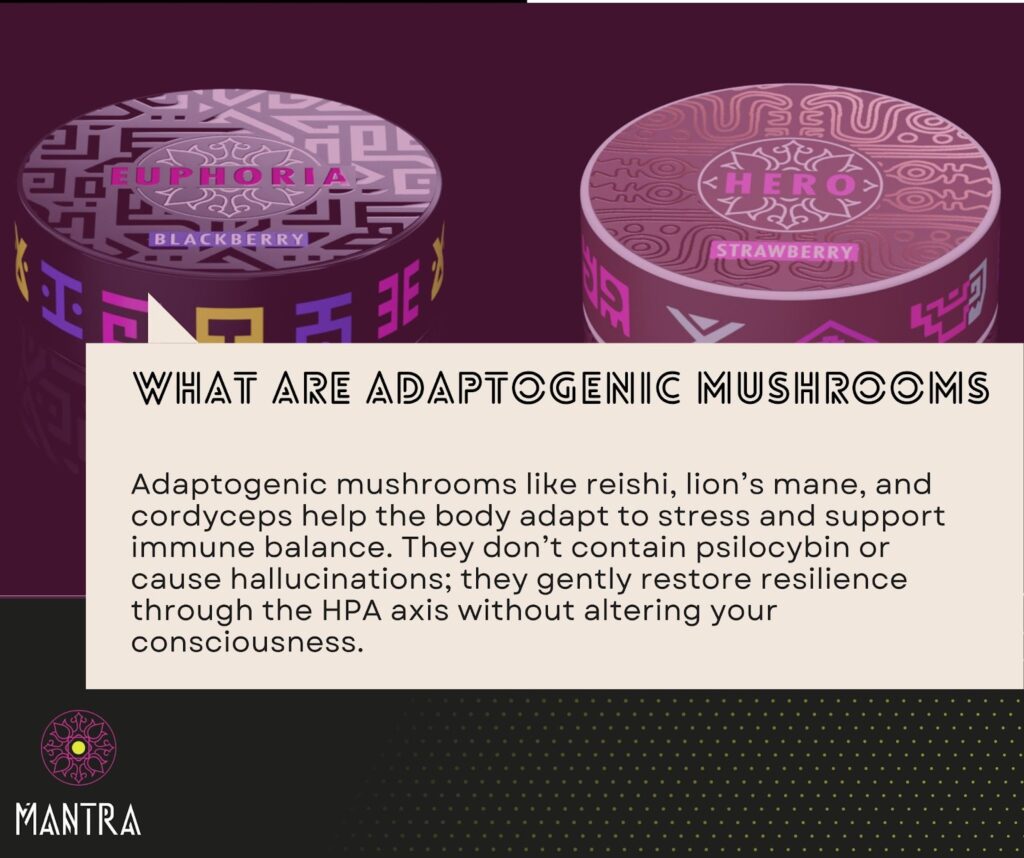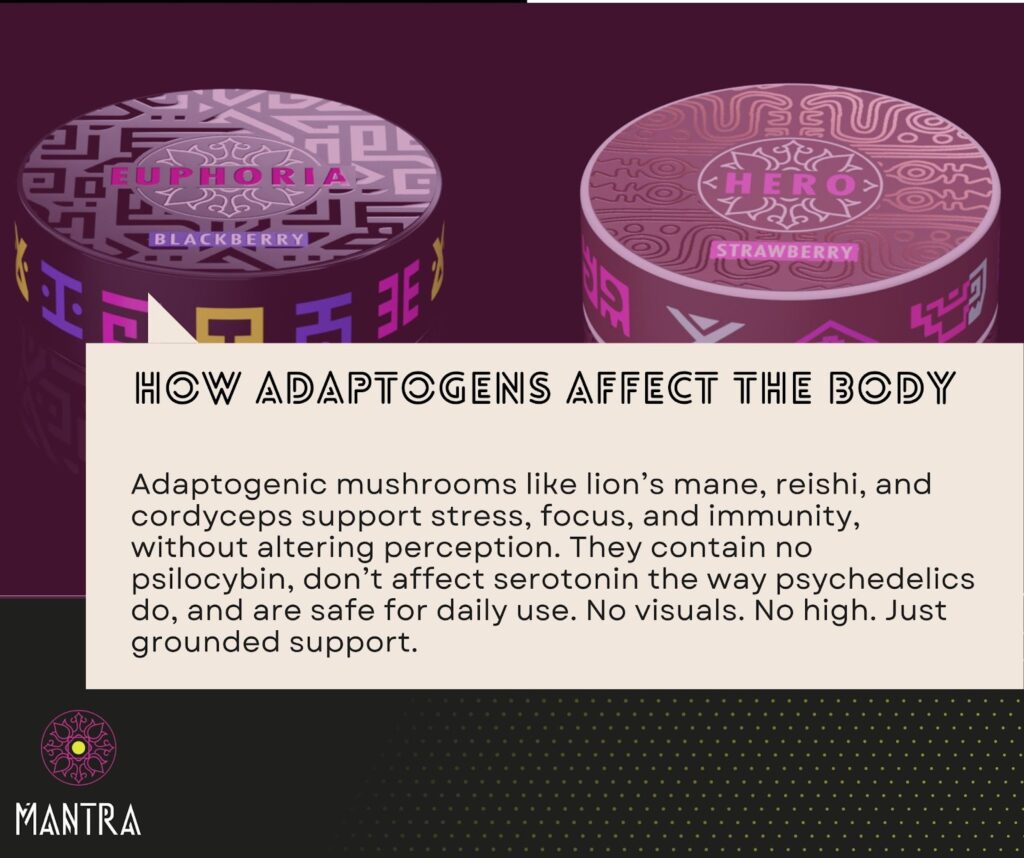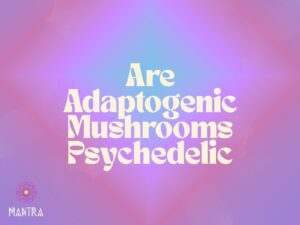Adaptogenic mushrooms like reishi, lion’s mane, and chaga are not psychedelic. They do not contain psilocybin or induce hallucinations.
Instead, they support stress resilience, focus, and immune balance, without altering perception or consciousness.
Whether you’re a wellness seeker exploring natural ways to stay balanced, a psychedelic-curious reader hoping to avoid a surprise trip, or a health-conscious beginner wondering about safety, here’s how it breaks down:
- Wellness seekers will find adaptogens supportive for stress, sleep, and immunity, without altering their state of mind.
- Psychedelic-curious individuals often confuse adaptogens with “magic mushrooms,” but these are functionally grounded, not mind-expanding.
- Beginners can feel reassured: no hallucinations, no psilocybin, no failed drug tests.
- Biohackers and nootropic users love lion’s mane and cordyceps for cognitive enhancement and energy, not for altered states.
- Therapists and practitioners recommend adaptogens like reishi post-journey to support nervous system regulation without introducing risk or psychoactivity.
Still unsure about what’s safe, what’s psychoactive, and how to choose wisely?
Mantra Dose bridges the ceremonial with the scientific, offering clearly labeled, reverent adaptogenic products crafted for clarity, not confusion.
Whether you seek focus, calm, or immune support, our mushroom blends respect both tradition and your intention.
Want the full breakdown, including how to spot misleading labels, avoid accidental tripping, and use adaptogens with confidence?
Keep reading.
What Are Adaptogenic Mushrooms?

Adaptogenic mushrooms are a class of functional fungi known for helping the body adapt to stress, regulate energy, and support immune balance.
Unlike their psychedelic counterparts, they don’t alter consciousness or perception.
Instead, they enhance the body’s resilience to mental, physical, and emotional stressors through biochemical interactions with the hypothalamic-pituitary-adrenal (HPA) axis, the system that governs your stress response.
Mushrooms like lion’s mane, reishi, and cordyceps fall under this adaptogenic category.
They’re not recreational, and they’re not mind-altering. Instead, they’re revered allies in nervous system regulation, mental clarity, and immune support.
But confusion arises because terminology in the mushroom world is slippery. Let’s clear it up:
- Adaptogenic mushrooms help regulate stress and restore balance (e.g., reishi, cordyceps).
- Functional mushrooms are a broader term encompassing any mushroom with health-promoting properties (e.g., immune support, antioxidants).
- Psychedelic mushrooms, such as psilocybin-containing species, alter perception, induce visions, and are used for deep spiritual or therapeutic journeys.
Unfortunately, the word “magic” is often used casually in branding, which muddies the waters.
A chocolate bar labeled as “magic” might contain only lion’s mane, but to someone unfamiliar, it might sound like an invitation to hallucinate. This is where the misconception stems from.
Adaptogens don’t disrupt your reality; they restore it. They work with your system, not against it.
There’s no psilocybin, no visuals, no consciousness shifts, only natural support for your body’s return to balance.
How Adaptogens Affect the Body (Not the Mind)

Let’s be clear: adaptogenic mushrooms will not get you high. They are not psychedelic, psychoactive, or hallucinogenic in any way.
While they may improve your focus, boost your immunity, or help you wind down, they do not contain psilocybin, the compound responsible for the visual and perceptual shifts in psychedelic mushrooms.
To understand the difference, compare three common adaptogens with their psychedelic cousin:
- Reishi: Known as the “mushroom of immortality,” it supports deep sleep, immune health, and emotional balance, without causing any alteration in perception.
- Cordyceps: Often used in sports nutrition, it may enhance energy and oxygen utilization, but there are no cognitive distortions or euphoria.
- Lion’s Mane: Celebrated for its neurogenesis benefits, this mushroom boosts nerve growth factor (NGF), supporting mental clarity, not mental distortion.
Now contrast these with psilocybin-containing mushrooms, which stimulate serotonin receptors (specifically 5-HT2A) in ways that shift mood, perception, and self-awareness.
Adaptogens, in contrast, do not bind to these receptors in the same way and have no known psychedelic effects. Their impact is grounded, subtle, and cumulative over time.
This makes adaptogens safe for daily use. They’re functional tools for enhancing your day, not escaping from it.
You can take lion’s mane before a work meeting, sip reishi tea before bed, or dose cordyceps before a workout, confident that you’ll stay fully grounded, clear-headed, and legally compliant.
No visuals. No distortions. No surprises.
Just fungi doing sacred work in quiet ways.
How It Differs by Intent and Identity
The question “Are adaptogenic mushrooms psychedelic?” is not only about chemistry, it’s about context. People arrive at this inquiry with different intentions, histories, and hesitations.
Here’s how the answer shifts depending on who’s asking.
Wellness Seekers Exploring Natural Supplements
You’re here for calm, not chaos. For many wellness-focused individuals, adaptogens offer a gentle path to balance. Reishi can support sleep and emotional grounding.
Lion’s mane may enhance focus and memory. These mushrooms work without psychoactivity, helping you stay clear, centered, and aligned with your healing goals.
There’s no risk of hallucinations, only the invitation to soften stress and build resilience from within.
Psychedelic-Curious But Cautious
You’re open to new experiences but want to stay safe. Maybe you’ve heard stories about profound journeys or bad trips. Products labeled “magic,” “shamanic,” or “elixirs” can feel risky when you’re not sure what’s inside.
Adaptogens like chaga or cordyceps are not the same as psilocybin mushrooms. Mantra Dose makes this distinction crystal clear.
Our labels and product lines are transparent, so you’ll never unknowingly walk through a portal you didn’t intend to open.
Health-Conscious Beginners Checking for Psychoactivity
You’re curious but cautious. Can I give this to my teenager? Will it make me fail a drug test? Is it safe to take at work?
These are valid concerns. Fortunately, adaptogenic mushrooms do not contain psilocybin. You won’t trip, you won’t fail a test, and you won’t lose your bearings in the middle of a PTA meeting.
Lion’s mane may enhance dream vividness, and reishi may invite a sense of openness, but neither will alter your reality.
Biohackers and Nootropic Enthusiasts
You’re not looking to leave your body; you’re looking to upgrade it. Biohackers often turn to mushrooms like lion’s mane for cognitive enhancement and cordyceps for energy and performance.
The effects are subtle, clean, and performance-oriented. There’s no alteration in perception, only deeper focus, smoother energy, and a nervous system that stays sharp under pressure.
Therapists & Practitioners Seeking Safe, Legal Tools
Clinicians and facilitators are increasingly incorporating adaptogens into post-journey protocols.
After deep psychedelic work, reishi or ashwagandha can help regulate the nervous system, promote rest, and create space for integration.
These tools are 100% legal, safe for most people, and completely non-psychoactive, making them ideal for those navigating trauma healing, nervous system recalibration, or spiritual grounding in professional settings.
Common Worries, and Why You Can Relax
In a world where mushroom products are everywhere, from grocery shelves to glowing influencer stories, it’s natural to feel uncertain.
Let’s walk through the top concerns and clear the air.
Will I accidentally get high?
No. True adaptogenic mushrooms like lion’s mane, reishi, and cordyceps contain no psilocybin or hallucinogenic properties.
Unless a product is intentionally mislabeled (a rare but real concern), there is no chance of an unintended trip.
Is this safe around kids or at work?
Absolutely. These mushrooms support calm and clarity without altering your consciousness.
Many use them to improve focus at work or soothe anxiety at home. There’s no impairment, no intoxication, and no risk of being “under the influence.”
Could it show up on a drug test?
No. Standard drug tests do not screen for adaptogens.
Psilocybin is the psychedelic compound that might raise red flags in sensitive tests, but it’s not present in any true adaptogenic mushroom blend. You’re safe.
Are there legal concerns?
None. Adaptogens like reishi, chaga, and lion’s mane are completely legal in most parts of the world.
They’re sold as dietary supplements, with no controlled substances involved. You can travel, work, and live freely with them in your wellness routine.
Will they cause anxiety?
Very rarely. In sensitive individuals, or in high doses, some adaptogens may stir emotional awareness or restlessness.
This is not because they’re psychedelic; it’s often psychosomatic, or due to the body adjusting. Start slow, stay intentional, and honor how your system responds.
When in doubt, choose products that respect the sacred and the science. Mantra Dose honors both.
Every blend is crafted for clarity, tested for purity, and rooted in trust, so your peace of mind is always part of the ritual.
So, What Should You Try Instead? (Without the Trip)
If you’re craving the benefits of mushrooms without the altered states, clarity without chaos, balance without the buzz, Mantra Dose offers a ceremonial path grounded in science, not speculation.
Here are a few of our most beloved adaptogenic offerings, crafted for conscious living and designed to elevate your essence:
Immortal Chocolates or Capsules
A sacred synergy of Reishi, Chaga, and Shilajit, this blend supports immune vitality, spiritual grounding, and longevity. It’s perfect for those seeking resilience and ritual without the risk.
No psilocybin. Only pure adaptogenic reverence.
Nootropic Microdose Capsules
Featuring Lion’s Mane paired with our signature non-psychoactive MAGIC blend, these capsules awaken creative flow, enhance mental clarity, and support neural regeneration.
Ideal for workdays, study sessions, or moments when you need your mind at its sharpest, without a psychedelic detour.
Serenity Capsules
A calming fusion of Ashwagandha, CBD, and magnesium, Serenity Capsules are designed for the overthinkers, the night owls, and the anxious-hearted. Plant-based peace, minus the high.
We honor the sacredness of the mushroom, not only for ceremony, but for daily restoration.
Whether you’re microdosing for clarity or embracing adaptogens for wellness, we believe every dose should be rooted in intention, integrity, and inner wisdom.
Final Takeaway: Use With Intention, Not Assumption
Adaptogenic mushrooms are not psychedelic, but don’t let that fool you; they are deeply powerful.
These fungi don’t unravel your ego or send you into visionary states. Instead, they whisper balance, build resilience, and nourish your system from the ground up.
They work slowly, subtly, and often silently, but their impact can be profound.
So use them not with the expectation of tripping, but with the reverence of a ritual. Let them be part of your breath, your morning tea, your reset between meetings, not your escape.
Because in a world obsessed with peak experiences, adaptogens remind us of the sacredness of stability. Of clarity. Of calm.
If you’re looking for safe, daily support for mood, immunity, cognition, or rest, these mushrooms are not your guides to other realms.
They’re your allies here in this one.
We have built our entire ecosystem around this knowing. Rooted in tradition, backed by science, designed for ceremony.
Top Questions People Are Asking
As interest in mushrooms continues to grow, so does confusion.
Below are the most common and important questions people ask when trying to understand the line between adaptogenic and psychedelic mushrooms.
Can adaptogenic mushrooms get you high?
No. Adaptogenic mushrooms contain zero hallucinogenic compounds. They do not include psilocybin and will not induce any sort of “trip.”
Their effects are grounded in calming, energizing, or immune-supporting properties, not altered states of consciousness.
Are adaptogens psychoactive?
Not in the traditional sense. While some may subtly support mood or calm the nervous system, they do not distort reality or change your perception.
Think of them as mood-supportive, not mind-altering.
Can they interact with medications?
Yes, in some cases. For example, reishi and ashwagandha may lower blood pressure or enhance the effects of sedatives.
If you’re on medication, pregnant, or managing a chronic condition, it’s always wise to consult with a healthcare provider before adding adaptogens to your routine.
Why do I feel different when I take lion’s mane or reishi?
You might experience a sense of calm, clarity, or even emotional openness.
These shifts are often the result of nervous system support, enhanced neurogenesis, or even a placebo, but they are not psychedelic and will not impair your cognitive function.
Why do I dream more vividly?
Lion’s mane has been linked to enhanced neuroplasticity and REM activity, which can amplify dream recall or intensity.
While these effects might feel trippy, they are not signs of hallucination; they’re a subtle byproduct of enhanced neural connectivity.
Is there a risk of accidentally consuming psilocybin?
Only if the product is mislabeled. Some brands blur the lines between ceremonial and recreational language, leading to confusion.
That’s why trusted sources like Mantra Dose clearly differentiate between their adaptogenic and psychedelic offerings, so you always know what you’re working with.
 Gummies
Gummies Capsules
Capsules Chocolate
Chocolate Minis
Minis Euphoria
Euphoria Hero
Hero Nootropic
Nootropic Serenity
Serenity Immortal
Immortal Raw
Raw![< ?php echo $cart['alt']; ? src=](https://mantradose.com/wp-content/uploads/2023/11/Group-8116.png) ">
">
